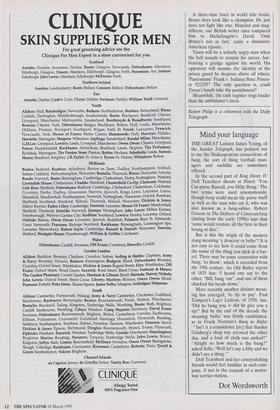Mind your language
THE GREAT Latinist James Young, of the Sunday Telegraph, has pointed out to me the Shakespearian connections of bung, the sort of thing football man- agers and suchlike are sometimes offered.
In the second part of King Henry IV Doll Tearsheet shouts at Pistol: 'You Cut-purse Rascall, you filthy Bung.' The two terms were used synonymously, though bung could mean the purse itself as well as the man who cut it, who was also known as a bung-nibber. Robert Greene in The Defence of Coneycatching (dating from the early 1590s) says that `some would venture all the byte in their boung at dice'.
But is this the origin of the modern slang meaning 'a douceur or bribe'? It is not easy to see how it could come from the name of the thing you stick in a bar- rel. There may be some connection with bung, 'to throw', which is recorded from the 19th century. An Old Bailey report of 1835 has: 'I heard one say to the other, "Bill, bung 'em", and one of them chucked the beads down.'
More recently another distinct mean- ing has emerged, 'to tip or pay'. Paul Tempest's Lag's Lexicon, of 1950, has, `Did he bung you = did he give you a tip?' But by the end of the decade the meaning 'bribe' was firmly established, as in Frank Norman's Bang to Right: " Isn't it a coinsidence [sic] that Stanley Golsberg's shop was screwed the other day, and a load of cloth was nicked?" "Alright so how much is the bung?" asked Solie. 'Well let's say a fifty and we didn't see a thing."' Doll Tearsheet and her coneycatching friends would feel familiar in such com- pany, if not in the carpark of a motor- way service-station.
Dot Wordsworth


























































 Previous page
Previous page